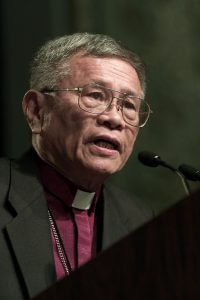Bishop, Educator, and Evangelist

Emerito P. Nacpil was admitted into the Methodist ministry in 1951 and served local churches until 1958. In 1956, he was ordained elder after receiving his Bachelor of Theological degree from Union Theological Seminary in Dasmariñas, Cavite. He finished his Bachelor of Arts from the Philippine Christian University, Manila, in 1958 and in 1962, he received a Doctor of Philosophy degree in Systematic Theology and Philosophy of Religion from Drew University, Madison, New Jersey.
Dr. Nacpil spent 14 years at UTS, starting as professor of theology in 1961 and ending as president in 1975. For the next 7 years he was Dean of the Southeast Asia Graduate School of Theology and Executive Director of the Association of Theological Schools in Southeast Asia. He was elected to the episcopacy in 1980 during the 12th Session of the Philippines Central Conference assigned to the Manila Episcopal Area.
The coming of Bishop Nacpil ushered in a new thrust and strategy in the mission evangelism ministry in the Manila Area. When he took office, most of the churches in the MEA had no program on mission evangelism, 75% of the local pastors did not conduct mission evangelism perhaps due to the fact that the seminary did not offer a course in evangelism, and there was no official policy at the annual conference level to promote mission evangelism.
Aided by an experimental program that assessed the elements that work in mission evangelism and the types of training that would be required of the clergy and lay, and after consultation with pastors and lay leaders, the Manila Episcopal Area came out with a program pattern for mission evangelism. The local church became the evangelism outpost that provided the leadership, training, and other resources to conduct and support its own evangelism program. The bishop and cabinet took responsibility for the mission evangelism program and they became evangelists themselves.
Bishop Nacpil also proposed the establishment of a Self-Reliance Fund, development of church properties with commercial possibilities to generate income, and challenged some Methodist institutions to allocate a percentage of their income to support the church’s outreach program.
The Central Conference Coordinating Council in its meeting on August 14-15, 1982, approved the Self-Reliance Fund program of The United Methodist Church in the Philippines to be raised in various stages throughout the whole connection. As envisioned and contained in a circular letter of Bishop Nacpil, the Fund was to be owned by the Philippines Central Conference with the objective of financing three major areas of concern, namely: (1) expansion of the Methodist constituency through increase in the membership of local churches and planting new Methodist churches in areas where there was none; (2) the purchase of new church lots and the construction of new church buildings and parsonages; (3) the standardization and stabilization of support for pastors and other church workers.
Bishop Nacpil was elected to a second consecutive term in 1984 and his election to a third consecutive term in 1988 made him the second and last Filipino bishop to be elected-for-life, before the privilege was rescinded. Bishop Nacpil completed his uninterrupted ministry as bishop for 20 years from 1980 until his mandatory retirement in 2000.
In 1997-1998, he became the first Filipino and first Asian to be installed as President of the United Methodist Council of Bishops. In May 2000, he also gained the distinction of being the first non-American bishop chosen to deliver the Episcopal address during the General Conference. Among his involvements were: Member and Vice-Chair, Faith and Order Commission; UMC observer at Vatican II; Member, Central Committee, World Council of Churches; moderator, Commission on Theological Concerns; Christian Conference of Asia; member, General Board of Global Ministries, 1980-188; member, Committee for Ecumenical Activities and Relations; Council of Bishops, 1984-1988; member, General Board of Higher Education and Ministry, 1989-1996; and chairman, the Council of Bishops Committee on the Study of the Global Nature of the Church, 1992-1996.
He has been dubbed as a world-class bishop with a great mind and great heart. In the words of Supreme Court Associate Justice Reynato S. Puno, “Bishop Nacpil targeted the transposition of our Church from a passive church to an active church in the matter of contributing inputs on the burning social, economic, political and religious problems confronting our people.”
Methodism in the Philippines: A Century of Faith and Vision, ed. by Bishop Jose Gamboa, Jr., Gamaliel T. de Armas, Jr., Roela Victoria Rivera, and Sharon Paz C. Hechanova. (Manila: Philippines Central Conference of The United Methodist Church, 2003).




